Zelin Wan
DASH: Deception-Augmented Shared Mental Model for a Human-Machine Teaming System
Dec 21, 2025Abstract:We present DASH (Deception-Augmented Shared mental model for Human-machine teaming), a novel framework that enhances mission resilience by embedding proactive deception into Shared Mental Models (SMM). Designed for mission-critical applications such as surveillance and rescue, DASH introduces "bait tasks" to detect insider threats, e.g., compromised Unmanned Ground Vehicles (UGVs), AI agents, or human analysts, before they degrade team performance. Upon detection, tailored recovery mechanisms are activated, including UGV system reinstallation, AI model retraining, or human analyst replacement. In contrast to existing SMM approaches that neglect insider risks, DASH improves both coordination and security. Empirical evaluations across four schemes (DASH, SMM-only, no-SMM, and baseline) show that DASH sustains approximately 80% mission success under high attack rates, eight times higher than the baseline. This work contributes a practical human-AI teaming framework grounded in shared mental models, a deception-based strategy for insider threat detection, and empirical evidence of enhanced robustness under adversarial conditions. DASH establishes a foundation for secure, adaptive human-machine teaming in contested environments.
Sustainable Smart Farm Networks: Enhancing Resilience and Efficiency with Decision Theory-Guided Deep Reinforcement Learning
May 06, 2025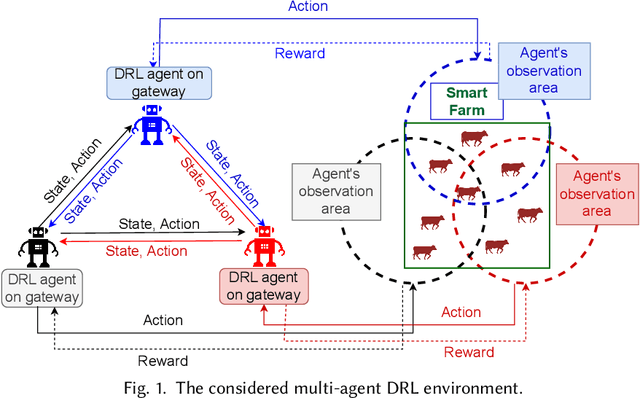
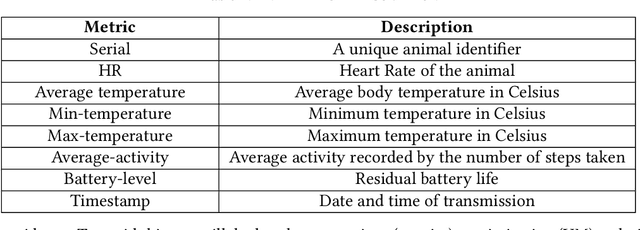
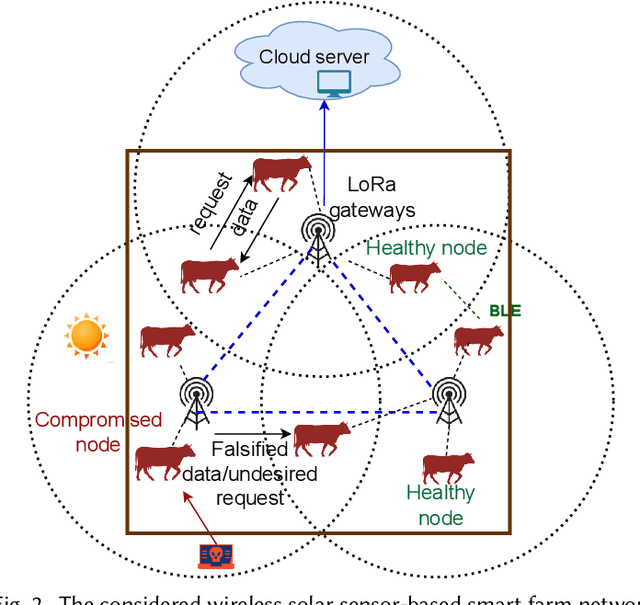
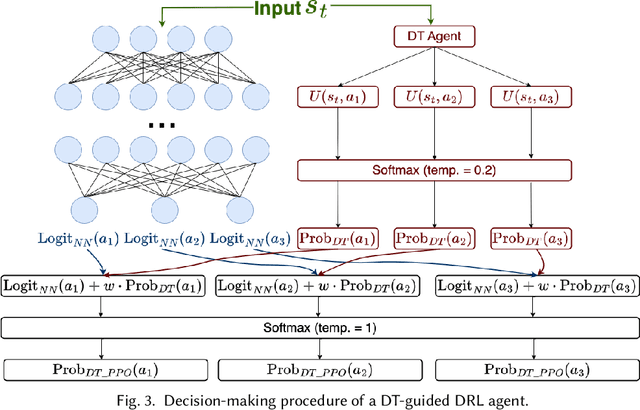
Abstract:Solar sensor-based monitoring systems have become a crucial agricultural innovation, advancing farm management and animal welfare through integrating sensor technology, Internet-of-Things, and edge and cloud computing. However, the resilience of these systems to cyber-attacks and their adaptability to dynamic and constrained energy supplies remain largely unexplored. To address these challenges, we propose a sustainable smart farm network designed to maintain high-quality animal monitoring under various cyber and adversarial threats, as well as fluctuating energy conditions. Our approach utilizes deep reinforcement learning (DRL) to devise optimal policies that maximize both monitoring effectiveness and energy efficiency. To overcome DRL's inherent challenge of slow convergence, we integrate transfer learning (TL) and decision theory (DT) to accelerate the learning process. By incorporating DT-guided strategies, we optimize monitoring quality and energy sustainability, significantly reducing training time while achieving comparable performance rewards. Our experimental results prove that DT-guided DRL outperforms TL-enhanced DRL models, improving system performance and reducing training runtime by 47.5%.
Advancing Human-Machine Teaming: Concepts, Challenges, and Applications
Mar 16, 2025Abstract:Human-Machine Teaming (HMT) is revolutionizing collaboration across domains such as defense, healthcare, and autonomous systems by integrating AI-driven decision-making, trust calibration, and adaptive teaming. This survey presents a comprehensive taxonomy of HMT, analyzing theoretical models, including reinforcement learning, instance-based learning, and interdependence theory, alongside interdisciplinary methodologies. Unlike prior reviews, we examine team cognition, ethical AI, multi-modal interactions, and real-world evaluation frameworks. Key challenges include explainability, role allocation, and scalable benchmarking. We propose future research in cross-domain adaptation, trust-aware AI, and standardized testbeds. By bridging computational and social sciences, this work lays a foundation for resilient, ethical, and scalable HMT systems.
Decision Theory-Guided Deep Reinforcement Learning for Fast Learning
Feb 08, 2024
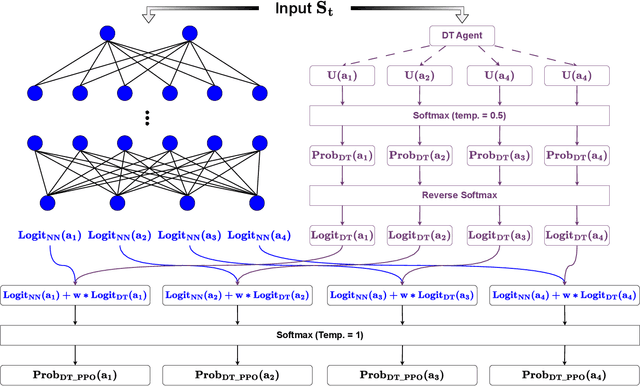
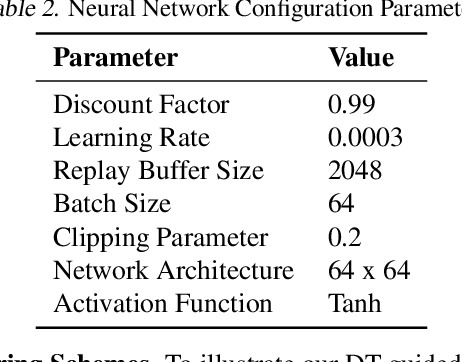
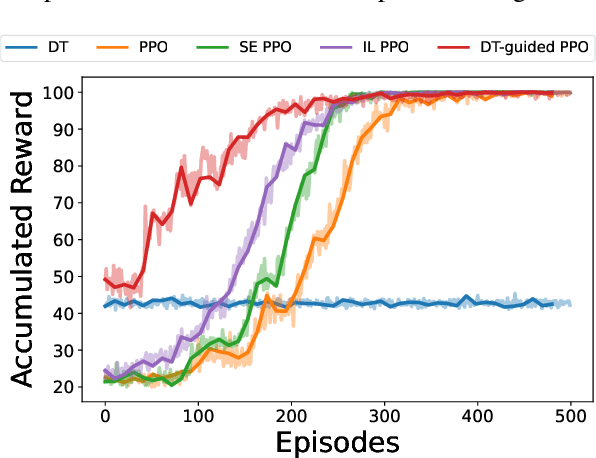
Abstract:This paper introduces a novel approach, Decision Theory-guided Deep Reinforcement Learning (DT-guided DRL), to address the inherent cold start problem in DRL. By integrating decision theory principles, DT-guided DRL enhances agents' initial performance and robustness in complex environments, enabling more efficient and reliable convergence during learning. Our investigation encompasses two primary problem contexts: the cart pole and maze navigation challenges. Experimental results demonstrate that the integration of decision theory not only facilitates effective initial guidance for DRL agents but also promotes a more structured and informed exploration strategy, particularly in environments characterized by large and intricate state spaces. The results of experiment demonstrate that DT-guided DRL can provide significantly higher rewards compared to regular DRL. Specifically, during the initial phase of training, the DT-guided DRL yields up to an 184% increase in accumulated reward. Moreover, even after reaching convergence, it maintains a superior performance, ending with up to 53% more reward than standard DRL in large maze problems. DT-guided DRL represents an advancement in mitigating a fundamental challenge of DRL by leveraging functions informed by human (designer) knowledge, setting a foundation for further research in this promising interdisciplinary domain.
A Survey on Uncertainty Reasoning and Quantification for Decision Making: Belief Theory Meets Deep Learning
Jun 14, 2022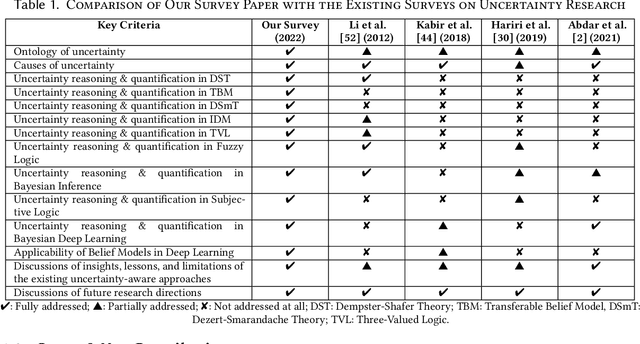
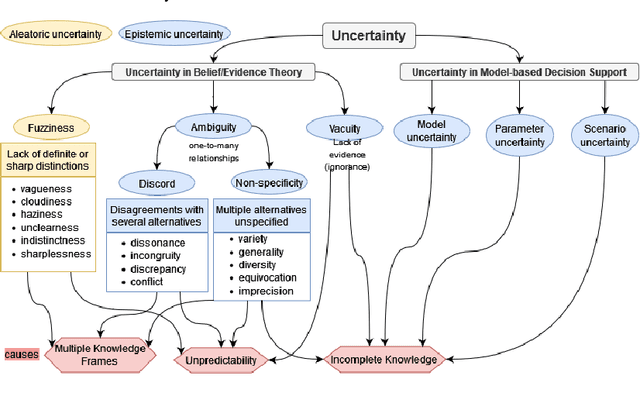
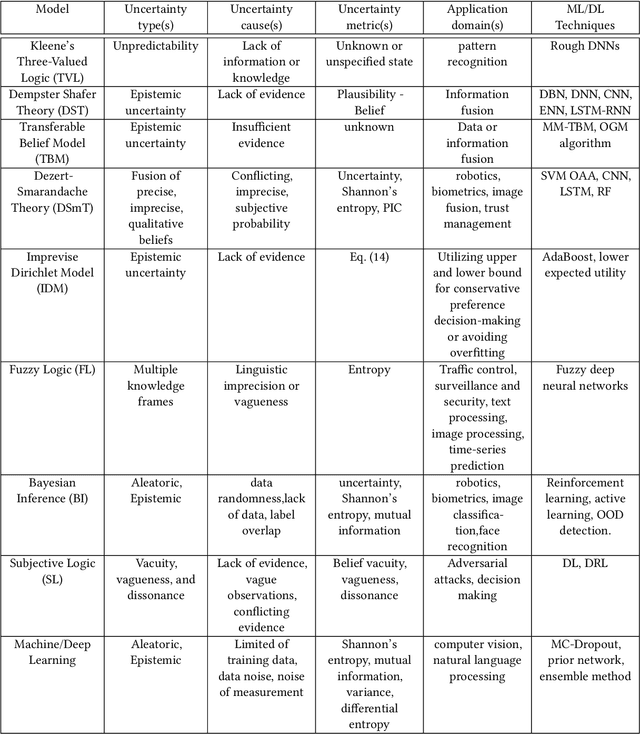
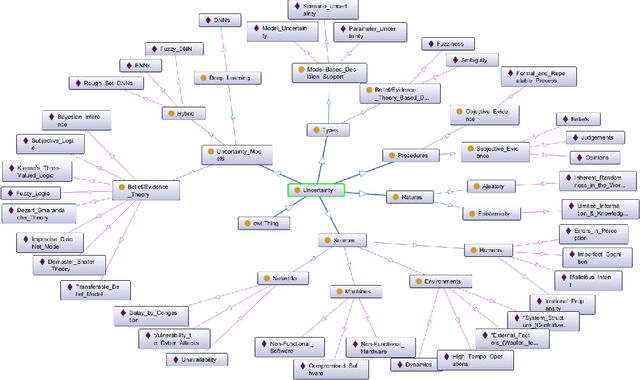
Abstract:An in-depth understanding of uncertainty is the first step to making effective decisions under uncertainty. Deep/machine learning (ML/DL) has been hugely leveraged to solve complex problems involved with processing high-dimensional data. However, reasoning and quantifying different types of uncertainties to achieve effective decision-making have been much less explored in ML/DL than in other Artificial Intelligence (AI) domains. In particular, belief/evidence theories have been studied in KRR since the 1960s to reason and measure uncertainties to enhance decision-making effectiveness. We found that only a few studies have leveraged the mature uncertainty research in belief/evidence theories in ML/DL to tackle complex problems under different types of uncertainty. In this survey paper, we discuss several popular belief theories and their core ideas dealing with uncertainty causes and types and quantifying them, along with the discussions of their applicability in ML/DL. In addition, we discuss three main approaches that leverage belief theories in Deep Neural Networks (DNNs), including Evidential DNNs, Fuzzy DNNs, and Rough DNNs, in terms of their uncertainty causes, types, and quantification methods along with their applicability in diverse problem domains. Based on our in-depth survey, we discuss insights, lessons learned, limitations of the current state-of-the-art bridging belief theories and ML/DL, and finally, future research directions.
Game-Theoretic and Machine Learning-based Approaches for Defensive Deception: A Survey
Jan 21, 2021



Abstract:Defensive deception is a promising approach for cyberdefense. Although defensive deception is increasingly popular in the research community, there has not been a systematic investigation of its key components, the underlying principles, and its tradeoffs in various problem settings. This survey paper focuses on defensive deception research centered on game theory and machine learning, since these are prominent families of artificial intelligence approaches that are widely employed in defensive deception. This paper brings forth insights, lessons, and limitations from prior work. It closes with an outline of some research directions to tackle major gaps in current defensive deception research.
 Add to Chrome
Add to Chrome Add to Firefox
Add to Firefox Add to Edge
Add to Edge